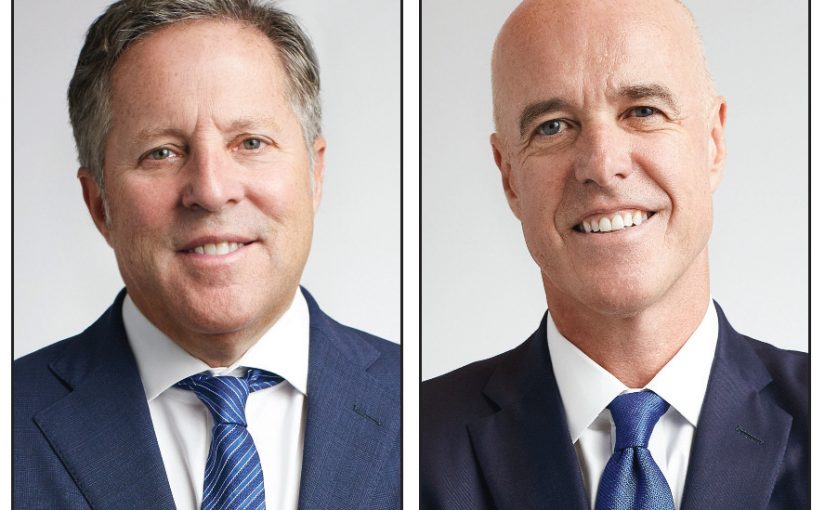In a Temple Sholom webinar May 6, ZLC Financial’s Garry Zlotnik, left, and Jon McKinney spoke on the topic Financial Planning in a Pandemic. (photos from Temple Sholom)
Reflecting on previous financial downturns – in 1987, 2000 and 2008 – Garry Zlotnik, chair and chief executive officer of ZLC Financial, admitted he felt worse now, during the COVID-19 pandemic, than in earlier recessions – not because of the economic implications but rather the health issues currently confronting the world.
“A year from now, two years from now, we’ll look back on this time and say, ‘Wow, that was just the most ridiculous, crazy thing in our lifetimes.’ But things will move forward in a positive way, with all the ingenuity that our population has,” Zlotnik said, adding that, as in any market, there are winners, such as Zoom, the web conferencing platform on which the webinar – called Financial Planning in a Pandemic – took place May 6.
Zlotnik was joined by Jon McKinney, ZLC’s president and portfolio manager, in the hour-long discussion, which was part of Temple Sholom’s Let’s Talk About It series.
McKinney holds overall responsibility for client relations, business development and administration at ZLC and has almost 30 years of financial sector experience in both portfolio management and accounting. Zlotnik, who has close to 40 years of experience as a chartered accountant and formed ZLC Wealth in 2000 – ZLC Financial was established in 1946 – also has served in numerous positions within the Jewish community, including as board president and chair of the Jewish Federation of Greater Vancouver, co-chair of the Vancouver JCC Maccabi Games, co-president of Vancouver Talmud Torah, treasurer of B’nai Brith Canada and president of the Richmond Country Club.
Though the spread of the virus has been flattening lately, the economic statistics – jobless claims, consumer spending – have been grim, with Canada’s economy further challenged by tense U.S.-China trade relations and a downward turn in the price of oil. According to McKinney, a silver lining has been the stimulus and bond buying by governments and central banks to prop up markets.
McKinney cited a Warren Buffett maxim from the midst of the 2008 recession: “Be fearful when others are greedy and be greedy when others are fearful.” If one had heeded that advice in late March of this year, he said, then April would have seen the best returns for equities since 1987, particularly as the U.S. Federal Reserve had been displaying its willingness to pump liquidity into the markets. The S&P 500 index, for example, gained 12.7% last month.
A principal message of the discussion was for investors to take a broad, long-term view. “Market timing is impossible,” McKinney cautioned. “But we can tell you there will be a bottom, and holding investments in companies that can weather this storm will be profitable long-term.”
In outlining ZLC’s own investment strategy, McKinney said, “We have reasonable diversification across different holdings and we pick good managers. We don’t just buy the index, and we look for companies that fly under the radar. We also invest in long/short funds and real estate.”
However, ZLC is concerned that there may be a retreat from the level the market is at now, as more bad news could filter through the system. Short-term, they believe, there could be a pullback and, if it comes, it will provide a great opportunity for investors.
“There are going to be some fairly volatile times ahead,” Zlotnik predicted, mentioning that it will take some time for people to get used to spending as they once did in pre-coronavirus times.
Oil and gas is one sector that has been beaten up in the past three quarters. It is, according to McKinney, contingent on the economy whether it rebounds, but many companies in the sector have seen strong gains through April and May.
“Every asset class has taken a hit,” Zlotnik said, though he sees opportunities in corporate bonds, which operate like a bond when a company’s price goes down and like equity when its price increases.
As for the Canadian dollar, McKinney forecasted the loonie either staying where it is or moving slightly higher after the recent rush to U.S. dollars, which tends to happen during economic crises.
For those with some money to put into the market, Zlotnik spoke of “dollar cost average strategy,” which means placing a fixed amount into a given investment on a regular basis. For example, if someone has $100,000 to invest, then they would place $10,000 in a given investment once a month for 10 months.
“It is important to know what one’s risk tolerance is and having a plan based on that,” he noted. Since March 2009, investment risk, for Vancouverites especially, has not been a factor, as both the equity and real estate markets have headed in an upwards direction.
A video of the webinar can be found on the Temple Sholom website: templesholom.ca/video.
Sam Margolis has written for the Globe and Mail, the National Post, UPI and MSNBC.

